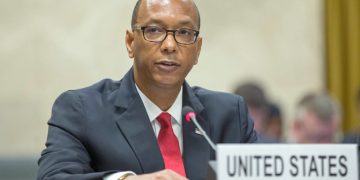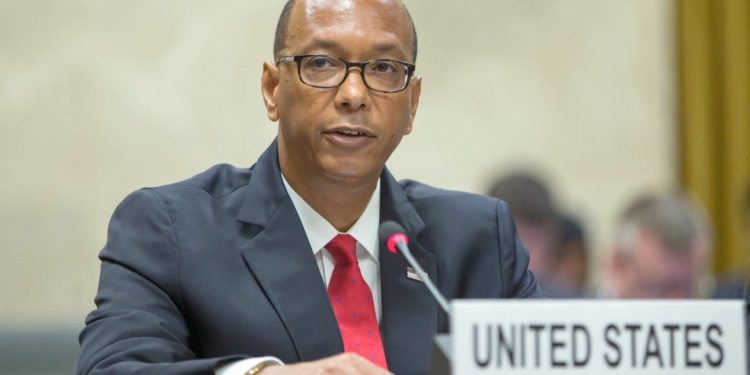Ambassador Robert Wood, the United States of America Alternative Representative for Special Political Affairs, has said that over two thousand civilians have been killed by armed groups in the Democratic Republic of Congo this year alone.
Ambassador Wood made the remarks Wednesday, October 26, 2022, at a United Nations (UN) Security Council Briefing on the Great Lakes Region.
“Attacks by armed groups – including State of Iraq and Syria – Democratic Republic of the Congo (ISIS-DRC), Cooperative for Development of the Congo (CODECO), and March 23 Movement (M23) – have killed over two thousand civilians this year,” he told the meeting.
He added: “This violence is unacceptable, and the United States calls on armed groups to discontinue their assaults on the DRC’s most vulnerable populations. We also call on state actors to stop their support for these groups, including the Rwandan Defense Forces’ assistance to M23.”
The meeting was attended by representatives from South Africa, Burundi, Rwanda, and the DRC.
He said the UN Regional Strategy for the Great Lakes is an important means of bringing peace to the region.
“And we appreciate the Special Envoy’s (Huang Xia, Special Envoy of the Secretary-General for the Great Lakes region) use of his good offices to generate international support for the Nairobi Process. Despite these efforts, the humanitarian and security situation in the Great Lakes region remains deeply troubling.”
He said the United Nations Organization Stabilization Mission in the Democratic Republic of the Congo (MONUSCO) remains critical to bringing peace to eastern DRC and the broader region – and it deserves our complete and unequivocal support.
“It too has suffered losses as the security situation worsens, including the death of a Pakistani peacekeeper just last month in a heinous attack. I extend my condolences to the mission, Pakistan, and the peacekeeper’s family,” noted Amb Wood.
According to him, Anti-MONUSCO rhetoric increases the already significant risk to peacekeepers.
“We are therefore concerned with calls for its immediate withdrawal and urge the DRC to work with MONUSCO toward a gradual, responsible, conditions-based withdrawal guided by benchmarks in the joint transition plan. No one would argue MONUSCO should remain in the DRC forever. But it serves an important purpose that aligns with the interests of the entire Great Lakes Region: protecting civilians, disrupting illicit networks, and helping stabilize governance and security institutions.”
Regional states – bilaterally and through the East African Community – have also deployed troops to address growing insecurity in eastern DRC.
As these efforts advance, Amb Wood noted, it is imperative they do not aggravate an already tense situation.
“As such, we call on regional leaders to ensure bilateral and multilateral forces respect human rights, prioritize the safety of civilians, and refrain from illicit activities, such as extraction of natural resources. It is equally critical they coordinate with and complement the important work of the DRC Armed Forces, MONUSCO, and UN humanitarian agencies and non-governmental organizations.”
He said States must also formally notify the 1533 Sanctions Committee of this assistance, in line with existing Security Council resolutions, including Burundian forces deployed bilaterally and under the EAC Regional Force.
“As is often the case, we have spent significant time today speaking about military solutions to a political problem. Of course, achieving peace in the Great Lakes will not come by force. Peace is contingent upon a political process, political will, and political solutions.”
To that end, he said the United States announced in September an additional $13 million in funding to support a transparent electoral process in the DRC.
“This funding is in addition to the $10.75 million we have already allocated for this effort. We look forward to an inclusive electoral process, ultimately concluding in free and fair elections,” said Amb Wood.
He added: “Strengthening democratic institutions, bringing justice to victims, holding bad actors to account, respecting states’ territorial sovereignty and integrity, and prioritizing civilians will help bring peace to the Great Lakes. The people of the region deserve nothing less.”
In response, DR Congo government spokesman, Patrick Muyaya, welcomed the United States government’s position on Rwanda’s alleged support of M23 rebels.
“We welcome the clear position of the US government against the support that Rwanda gives to the M23,” Muyaya tweeted.
He added: “Other countries should follow suit and work to end this barbarism which is causing the death and massive displacement of our populations.”
Kinshasa on Saturday resolved to expel the Rwandan ambassador, Vincent Karega, after M23 rebels seized a second border town- Kitagoma on Friday.











